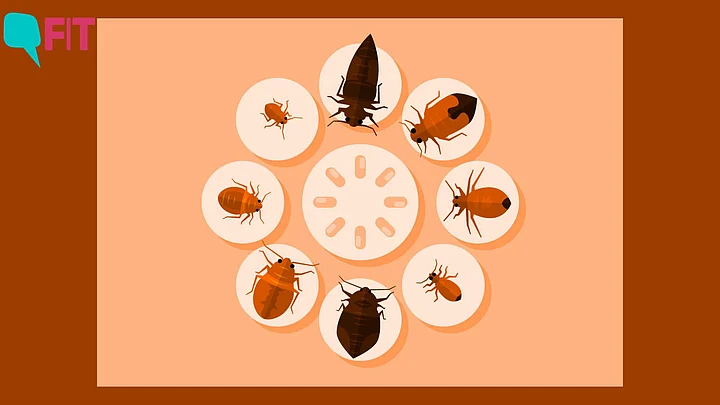First, it was Paris. And now it's Seoul, Hong Kong, and even Singapore.
There is fear of a bedbug outbreak in parts of Asia after South Korea became the first country in the region to launch a four-week campaign against them after multiple reports of infestations sparked public anxiety.
What is behind these bedbug outbreaks? Will it get worse? How does it impact your health? FIT explains.
Tracing the History Of Bedbugs
The earliest record of bed bugs associated with humans was from an Egyptian archaeological site dating to some 3,550 years ago. During the Roman era, bed bugs were common in the Mediterranean, and the subsequent worldwide spread of bed bugs was the result of a boom in shipping trade.
By the early 20th century, bed bugs had become extremely widespread. In fact, in the 1800s, some London hotels were so infested that lodgers “were advised to become half-drunk to obtain some sleep,” according to a recent scientific review. Entire edifices would be burned down in order to stamp out an infestation.
However, the introduction of dichlorodiphenyltrichloroethane (DDT) and other synthetic organic insecticides in the early 1940s onward helped reduce infestations by these insects. By the 1960s, infestations had become rare in developed countries.
Bedbug Outbreaks Across Countries
But now, bedbugs are back.
In the last 20-odd years, there has been a “global resurgence” in bedbugs, according to a recent scientific review. In Australia, for example, bed bug infestations spiked by an estimated 4,500 percent between 1999 and 2006. In 2010, cities such as New York experienced huge bedbug infestations.
However, 2023 saw an unusually high number of such incidents – starting in Paris. Since later September, videos of bedbugs swarming the Paris metro surfaced fueling fears of a widespread outbreak.
Emmanuel Grégoire, Deputy Mayor of Paris, told French TV: “No one is safe. You can catch them anywhere and bring them home, and not detect them in time until they have multiplied and spread.”
In South Korea, bedbugs were first found in a sauna in Incheon, as well as university dormitories and gosiwons (single-room accommodations), according to the government. In Seoul airport, a team of people, wearing hazmat suits, are looking for bedbug infestations, with the country reporting at least 13 confirmed cases of bedbug infestations in the last few days.
In Hong Kong, meanwhile, reports of a bedbug sighting on an airport train created a furore.
Major pest control firms in Singapore have reported that they have recorded an increase in enquiries over the last six months – with some reporting a 20-40 percent increase in enquiries.
“Personal hygiene is a very important factor. We just have to keep a lookout to places that we travel, especially in hotel rooms and the things that we are going to bring back from overseas,” Pierce Chan of Aardwolf Pestkare, a leading pest control firm in Singapore, told Channel News Asia.
Why Are Parts Of the World Witnessing a Surge Now?
One of the reasons behind the surge in bed bug infestation is how new generations of bedbugs are highly resistant to any chemicals like DDT that are used to treat them.
“The bugs we have today are not the same as their grandparents,” Dini Miller, professor of entomology and urban pest management specialist at Virginia Tech told Times Magazine.
“We have thick-skinned, hard-drinking, mutant bed bugs," she added. What has essentially happened, according to Miller is that exposure to the pesticides has pushed these insects to develop tougher exoskeletons, which prevents the chemicals from penetrating their bodies.
Nina Jenkins, an affiliate professor of entomology at Penn State University, explained why chemicals are unable to penetrate the bodies of bedbugs. "Bed bugs walk on hooked claws and lift their bodies off the ground. As a result, the amount of bed bug that contacts a surface when they are walking is a very small proportion of their body. So if they walk over a toxin-treated surface, they don’t absorb enough to kill them."
And in cases, these insects do absorb some of the chemicals, they have developed enzymes that can break apart toxins and neutralise them.
“We may knock them down and they look dead, but four hours later, they get up and shake it off because the enzymes in their bodies are breaking down the insecticide and they can recover,” added Miller.
Two other factors that play a role in the spread of bedbugs are population density and travel. It's basic science that an infestation spreads quickly in tightly packed areas.
Both Paris and Seoul have high population densities ( 20,641 inhabitants per sq km and 15,600 people per sq km, respectively) which may partly explain why they are experiencing an outbreak.
People are traveling more than ever before giving bedbugs an opportunity to spread.
“Just imagine if one checked into a hotel in Bangkok that has bedbugs, the bedbugs hitchhiked in the luggage and this person then checked into another hotel in Singapore. The insects will get transported to the new location, leave the luggage and start the infestation in this new location,” Chow-Yang Lee, a professor of urban entomology at the University of California, told The New York Times.
Do Bed Bugs Cause Health Problems?
The health risk from bedbugs is not very substantial. It is itchy bites and a small risk of allergies and secondary infections.
The bigger impact tends to be psychological, Clive Boase, an entomologist and pest-control consultant, told The Economist.
"Mosquitoes, leeches and other parasites are unpleasant. But do not colonise your home. If a traveller brings bedbugs back from their holidays, they can start an infestation that can be very difficult to shift. It causes people to feel shame, and they may develop a fear of being stigmatised, " he added.
(At The Quint, we question everything. Play an active role in shaping our journalism by becoming a member today.)
